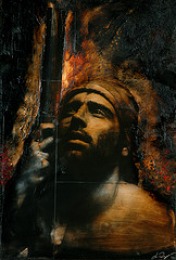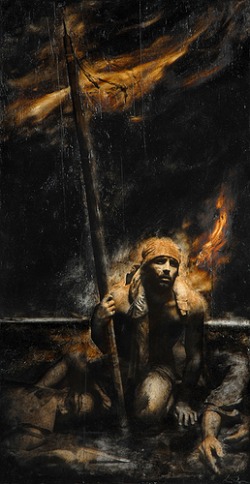History of Shamgar

"And after him was Shamgar the son of Anath, which smote of the Philistines six hundred men with an ox-goad; and he also saved Israel. ~ Judges 3:31 NIV
In the time of the Judges in the Old Testament, there was no king. The Israelites had no weapons and in fear kept to the shadows. And as oppression squeezed in upon the people another rose up to deliver them. They say it was 600 he killed with nothing more than an oxgoad, a simple farm tool worthy of nothing more than moving cattle, but with it he saved his people. In this incredible story that is told, he is sadly mentioned only in passing.
His name is Shamgar. Few remember his name.
This man, this biblical hero, might as well be eligible for the position of the most obscure character in the Bible: his name is mentioned in only two places. We do not have knowledge whatsoever about his birth, childhood, youth, family, education, career. To him the author of Judges does not allocate any particular hometown, wealth or obituary. His history lies in the shadows by the more important stories of Ehud and Deborah.
In the time of the Judges in the Old Testament, there was no king. The Israelites had no weapons and in fear kept to the shadows. And as oppression squeezed in upon the people another rose up to deliver them. They say it was 600 he killed with nothing more than an oxgoad, a simple farm tool worthy of nothing more than moving cattle, but with it he saved his people. In this incredible story that is told, he is sadly mentioned only in passing.
His name is Shamgar. Few remember his name.
This man, this biblical hero, might as well be eligible for the position of the most obscure character in the Bible: his name is mentioned in only two places. We do not have knowledge whatsoever about his birth, childhood, youth, family, education, career. To him the author of Judges does not allocate any particular hometown, wealth or obituary. His history lies in the shadows by the more important stories of Ehud and Deborah.

Deborah mentions him only once as she describes the historical background which defined the circumstances that propped her up as a most important person in the leadership of a very subtle nation: commerce had almost completely halted, travel had left the main thoroughfares for small and safer byways, the black market was steadily flourishing, and idolatry was preferred to true worship. Violence had escalated making the Israelites defenseless and vulnerable to their enemies assault due to the lack of military training and weapons endowment. The Philistines had perfected the technology of metal processing and utilized their expertise in making a variety of weapons for warfare. (1 Sam. 13:19-23)
The Philistine army ensighted fear in the Israelites as they were attacked over and over again. Shamgar, an Israelite farmer, was compelled to act on behalf of his people and forced to overcome an array of disadvantages against the Philistine occupation forces. First, he was a simple farmer not a trained military soldier. His weapon of choice was improvised from an oxgoad (a stick with a sharp iron head on one end for prodding an ox and a flat chisel on the other end used to chip away dried mud from a plow), a tool used to assist in plowing fields. And last, he chose to challenge his adversary alone.
It is said his victims reached the incredible number of 600. It is believed the methodology of his campaign was that of modern day gorilla warfare. The fight for freedom was arduous at best, but significant just the same. Shamgar led a fair fight and secured freedom for his people. And for this reason his contribution to the history of Israel was considered significantly important, and thus he received the title of “deliverer”.
To appreciate the magnitude of this great achievement it is necessary to compare it with other similar achievements of that period in time. Ehud had a great army and exterminated 10,000 Moabites; Barak had ten thousand soldiers and dismantled an army of 900 chariots and 100 times more infantry; Gideon and his 300 men scattered a countless army of nomads; Samson killed once 1,000 Philistines with a jawbone; and at the pinnacle of his life, Samson made a house collapse over 3,000 Philistines and perished with them.
Shamgar assessed the situation at hand, took what he had, where he was, and did what he could. Likewise, we should never consider ourselves insignificant, unimportant, unprepared, or unknown. Such character traits are exactly what God can use for His glory, just like he did with Shamgar.
The Philistine army ensighted fear in the Israelites as they were attacked over and over again. Shamgar, an Israelite farmer, was compelled to act on behalf of his people and forced to overcome an array of disadvantages against the Philistine occupation forces. First, he was a simple farmer not a trained military soldier. His weapon of choice was improvised from an oxgoad (a stick with a sharp iron head on one end for prodding an ox and a flat chisel on the other end used to chip away dried mud from a plow), a tool used to assist in plowing fields. And last, he chose to challenge his adversary alone.
It is said his victims reached the incredible number of 600. It is believed the methodology of his campaign was that of modern day gorilla warfare. The fight for freedom was arduous at best, but significant just the same. Shamgar led a fair fight and secured freedom for his people. And for this reason his contribution to the history of Israel was considered significantly important, and thus he received the title of “deliverer”.
To appreciate the magnitude of this great achievement it is necessary to compare it with other similar achievements of that period in time. Ehud had a great army and exterminated 10,000 Moabites; Barak had ten thousand soldiers and dismantled an army of 900 chariots and 100 times more infantry; Gideon and his 300 men scattered a countless army of nomads; Samson killed once 1,000 Philistines with a jawbone; and at the pinnacle of his life, Samson made a house collapse over 3,000 Philistines and perished with them.
Shamgar assessed the situation at hand, took what he had, where he was, and did what he could. Likewise, we should never consider ourselves insignificant, unimportant, unprepared, or unknown. Such character traits are exactly what God can use for His glory, just like he did with Shamgar.